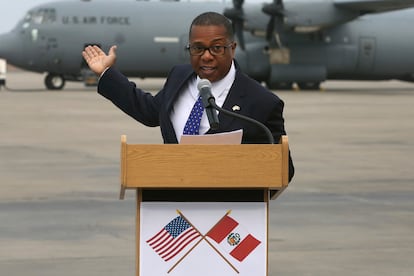The US slaps sanctions on two former presidents of El Salvador, a Guatemala prosecutor and high-ranking Nicaragua officials
The State Department warns that it ‘will consider all available tools to deter and disrupt anti-democratic activity’ in Central American countries


The U.S. has issued a package of sanctions against 39 Central American politicians and senior officials from El Salvador, Nicaragua, Guatemala and Honduras. Among them are former Salvadoran presidents Mauricio Funes (2009-2014) and Salvador Sánchez Cerén (2014-2019), who have been accused of having ties to corrupt networks. Also in the firing line is Guatemalan prosecutor Cinthia Monterroso, who was behind the conviction of José Rubén Zamora, the former editor of the newspaper elPeriódico who was sentenced to six years for alleged money laundering in a move perceived as political persecution; and Judge Fredy Orellana, who is seen to be damaging progressive candidate Bernardo Arévalo’s bid for the presidency of Guatemala. The sanctions are also directed at Honduran leaders and 13 officials in Daniel Ortega and Rosario Murillo’s regime in Nicaragua, responsible for stripping more than 300 Nicaraguan opponents of their nationality last February, forcing them into exile and confiscating their assets.
Washington included these individuals on the Corrupt and Undemocratic Actors list, known as the Engel List, on Wednesday, July 19, based on credible information and allegations regarding the conduct in question as reported on by the media and other sources. “The Department will continue to review the individuals listed in the report and consider all available tools to deter and disrupt corrupt and undemocratic activity in El Salvador, Guatemala, Honduras, and Nicaragua,” the report states.
For Nicaragua, these sanctions come at a time when the presidential couple is celebrating the anniversary of the 1979 Sandinista revolution that overthrew the Somoza dictatorship, and they represent a practical, political and symbolic blow for the Sandinista Front, whose regime has itself become totalitarian, accused of committing crimes against humanity, become internationally isolated and, according to the latest poll by the polling firm CID Gallup, registering the lowest degree of political sympathy in its history. Only 13% of Nicaraguans declare themselves sympathetic to the Sandinista Front. And as the presidential couple faces “signs of discontent” among its core supporters, hundreds of public workers are leaving for the United States under the migratory Humanitarian Parole program.
“Nicaraguans exercising basic freedoms face repression, imprisonment, and revoked citizenship. This makes government claims of prosperity and peace ring hollow. Today, the U.S. announces actions to promote accountability for Nicaraguan officials undermining democracy,” said Brian A. Nichols, Washington’s Assistant Secretary of State for Western Hemisphere Affairs in a tweet.
The officials sanctioned are Nicaraguan Attorney General, Wendy Carolina Morales Urbina; members of the National Assembly, Arling Patricia Alonso Gómez, Gladis de los Ángeles Baez, Loria Raquel Dixon Brautigam and Alejandro Mejía Ferreti. Also on the list are appeals court judges Rosa Argentina Solís Dávila and Ángela Dávila Navarrete; the director of the Financial Analysis Unit (UAF), Denis Membreño Rivas, and the deputy director of the UAF, Aldo Martín Sáenz Ulloa.
The 13 officials are accused of undermining the institutions which they serve by confiscating property from opponents without legal basis and from non-governmental organizations with a clear strategy of suppressing freedom of association. The sanctioned officials are accused of undermining their institutions by coordinating reprisals to strip opponents of their nationality, providing financial information on exiled political dissidents and former political prisoners in order that their assets and pensions be seized without legal basis.
Also included were the director and deputy director of the National Directorate of Property Registrar Offices, Valeria Maritza Halleslevens Centeno and Eduardo Celestino Ortega Roa; the current vice-superintendent of banks and other financial institutions (SIBOIF), Marta Mayela Díaz Ortiz and the deputy director of the Nicaraguan Social Security Institute (INSS), Sagrario de Fátima Benavides Lanuza.
The Engel list is based on Section 353 of the United States – Northern Triangle Enhanced Engagement Act, that decides on the eligibility of individuals entering U.S. territory, with powers to confiscate visas and ban entry. Initially, the Engel List only affected officials from the Northern Triangle of Central America: Honduras, Guatemala and El Salvador. However, since last year, it has also been applied to Nicaraguan officials. This would be the third time it has been used against officials of the Ortega-Murillo regime in Nicaragua. The first time was in March 2023, when nine Nicaraguan officials were included on the list. Now, the total of officials from the Sandinista regime stands at 45.
The sanctioned individuals are those who, in President Joe Biden’s opinion, have participated “in actions that undermine democratic processes or institutions, in significant corruption and in obstruction of investigations into such acts of corruption.”
For each Sandinista official sanctioned, the U.S. provides a justification. For example, in the case of Wendy Carolina Morales Urbina, they claim that she “undermined democratic processes or institutions, using the office of the attorney general to facilitate a coordinated campaign to suppress dissent, by confiscating property from the government’s political opponents without a legal basis. Urbina has also seized property from thousands of nongovernmental organizations under laws explicitly designed to suppress freedom of association.”
Guatemalan prosecutor Monterroso and Judge Orellana are sanctioned for conducting investigations into journalists exercising their right to freedom of expression and bringing them to trial. The government of current President Alejandro Giammattei, who defends Monterroso and Orellana and is himself accused of encouraging an authoritarian drift, rejected the accusations and accused the United States of trying to “impose its jurisdiction on people abroad.”
So far, Nicaragua’s presidential couple has not issued a statement regarding the newly sanctioned figures in Nicaragua featured on the Engel List. Ortega and Murillo are expected to appear on national TV at some point during the afternoon of July 20 to preside over the anniversary of the Sandinista revolution without the presence of a large public as was the custom prior to 2018.
Meanwhile, the Race and Equality Institute pointed out on July 19 that as of May 2023, 64 people have been deprived of liberty for political reasons in Nicaragua, according to the latest update from the Mechanism for the Recognition of Political Prisoners, 10 of whom are women. “In May, 90 people were arbitrarily arrested by the Ortega-Murillo regime, among them people perceived as opponents, as well as journalists and activists from various departments of the country. A new form of repression used by the regime is to impose an alternative measure of periodic presentation as well as cautionary measures,” the Race and Equality Institute stated. “At least 81 people were illegally prosecuted in the period covered, as well as there being an increase in the number of former political prisoners being recaptured and prosecuted again (14); most notable are the number of people kept in differentiated cells [solitary confinement and cells with punishing conditions] (15).”
Sign up for our weekly newsletter to get more English-language news coverage from EL PAÍS USA Edition
Tu suscripción se está usando en otro dispositivo
¿Quieres añadir otro usuario a tu suscripción?
Si continúas leyendo en este dispositivo, no se podrá leer en el otro.
FlechaTu suscripción se está usando en otro dispositivo y solo puedes acceder a EL PAÍS desde un dispositivo a la vez.
Si quieres compartir tu cuenta, cambia tu suscripción a la modalidad Premium, así podrás añadir otro usuario. Cada uno accederá con su propia cuenta de email, lo que os permitirá personalizar vuestra experiencia en EL PAÍS.
¿Tienes una suscripción de empresa? Accede aquí para contratar más cuentas.
En el caso de no saber quién está usando tu cuenta, te recomendamos cambiar tu contraseña aquí.
Si decides continuar compartiendo tu cuenta, este mensaje se mostrará en tu dispositivo y en el de la otra persona que está usando tu cuenta de forma indefinida, afectando a tu experiencia de lectura. Puedes consultar aquí los términos y condiciones de la suscripción digital.








































